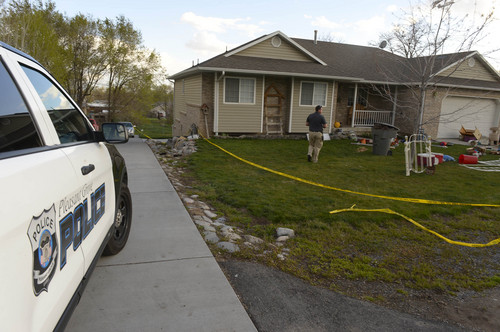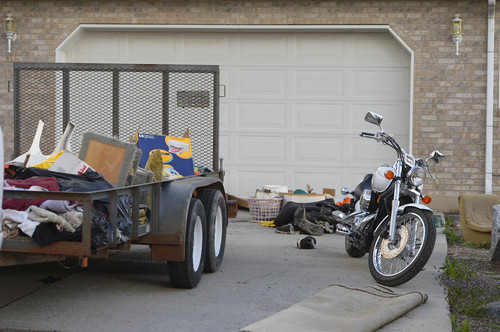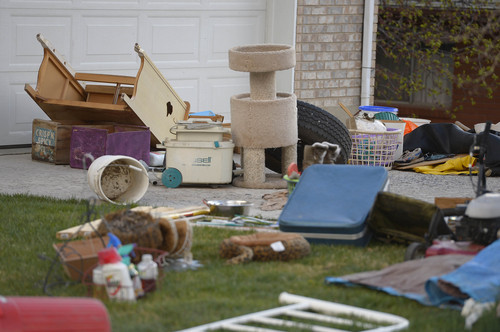This is an archived article that was published on sltrib.com in 2014, and information in the article may be outdated. It is provided only for personal research purposes and may not be reprinted.
Experts say there are few cases like that of a Pleasant Grove mother who allegedly killed six newborns and left them in cardboard boxes in her garage.
"Sequential filicide like this is very rare," said Geoffrey McKee, author of "Why Mothers Kill: A Forensic Psychologist's Casebook." The most recent case he could recall happened four years ago in France, when a woman admitted to suffocating eight of her newborns and concealing their corpses in the garden and garage of her home.
Also in 2010, the remains of five infants born in secret to a Pennsylvania woman were found in a closet. She pleaded guilty to killing one and said the others were stillborn.
Hiding a pregnancy is more common — as 39-year-old Megan Huntsman apparently did seven times between 1996 and 2006 while living with her now-estranged husband and three daughters. Police say Huntsman claims one child was stillborn.
"Concealing a pregnancy is not unusual, especially in teenagers or women who have children who may fear disclosure to a spouse or family," said Susan Dowd Stone, a New Jersey therapist and expert on postpartum depression.
Much is still unknown about Huntsman, who would have been about 21 years old at the beginning of the period police say the babies died. Though she allegedly admitted to the killings, authorities have not yet named any motive.
McKee, a clinical professor at the University of South Carolina School of Medicine, has evaluated 34 girls and women who killed one or more of their children, with the highest rate of those cases happening with children younger than 1 year old. (When fathers kill, the victims are usually 12 or older.)
"It's typically one child in a single incident," McKee said, and often those cases generate little public attention. Many mothers don't have a specific clinical diagnosis, but become emotionally detached from their fetus, often a factor in cases of girls who accidently get pregnant and abandon the child after birth.
In other infant deaths, child abuse or neglect is a factor. In a third category, a woman is diagnosed as mentally ill.
"These are cases where the mother is really delusional and has psychologically limited contact with reality," McKee said. "She kills her children because she believes they've become 'infected' or ... to save them for heaven."
These cases are far different than postpartum depression, which affects about 13 percent of pregnant women and new mothers, according to the U.S. Department of Health and Human Services.
"This is not postpartum depression," Stone said. "This kind of mental illness, if indeed it is mental illness, is rare, very rare."
A far smaller number of women, fewer than 1 in 2,000, develop the more severe postpartum psychosis, in which they have "intrusive" thoughts of hurting their child, Stone said. Few act on those thoughts; most seek help.
About 95 percent of women who commit filicide fall into one of those three categories, McKee said — detachment, abuse or mental illness. McKee's last two types are rare: the retaliatory mother, who kills a child to punish someone else, and the psychopathic mother, like those who purposely make a child sick as in Münchausen syndrome by proxy.
Huntsman appears to have given birth to and reared at least one child during the period police say the newborn babies died.
If mental illness is a factor in this case, that could have happened as symptoms waxed and waned, or if a condition was diagnosed and treated at any point, Stone said.
Those are among the many questions that remain, including the identity of the children's father, whether anyone else was aware of the pregnancies and whether she was treated for mental illness.
McKee said "safe haven" laws, which Utah has had since 2001, and public education can help tackle the larger issue.
"The best thing is early intervention," he said. "The sooner the pregnancy is detected, if someone else knows ... then intervention can begin, prenatal care can begin, and with that you increase the chance of having a healthy baby."
Twitter: @lwhitehurst —
Safe Haven law enacted to save babies' lives
Utah has had a Safe Haven law on the books since 2001, allowing biological parents to anonymously give up custody of a newborn child without facing any legal consequences. Intended to save children's lives, the law tries to prevent women from abandoning infants in places such as trash cans and bathrooms.
Exactly how many babies have been saved in Utah is difficult to determine, because some women call the Safe Haven hotline at 1-866-458-0058 to learn about resources such as adoption, pregnancy health information and programs that provide financial support for keeping a baby.
The hotline is open 24 hours a day, every day of the week. For more information, go to utahsafehaven.org or follow them on Twitter at twitter.com/UtahNewborn.







